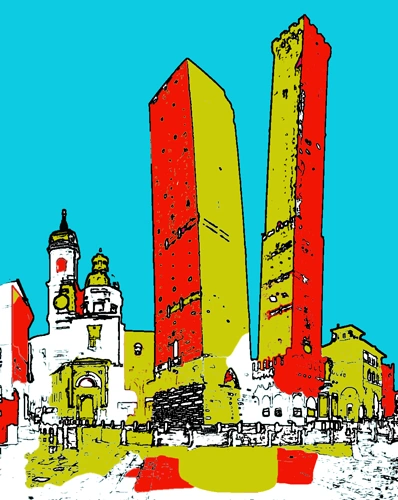
Joint ABCD Special Interest
Groups Meeting 2024
Joint ABCD Special Interest
Groups Meeting 2024
Bologna, Italy • 17-19 October 2024
Bologna, Italy • 17-19 October 2024
Joint ABCD Special Interest
Groups Meeting 2024
Bologna, Italy • 17-19 October 2024
Thursday, 17 October 2024 |
|
13:00-14:00 |
Registration |
13:50-14:00 |
Welcome |
14:00-15:00 |
Opening Lecture Chiara Di Malta (TIGEM and University of Naples Federico II, Italy) |
15:00-16:15 |
Cancer biology Chairs: Anna Maria Porcelli, Paola Defilippi Aristide Ferrante (Foggia, Italy) Manuela Sollazzo (Bologna, Italy) Noemi Ghiglione (Turin, Italy) Alessandro Carrer (Padua, Italy) Marco Russo (Bologna, Italy) |
16:15-16:30 |
Short presentations Debora Gentile (Naples, Italy) Alexia Conte (Milan, Italy) Alessia Ruzza (Padua, Italy) |
16:30-16:40 |
Discussion |
16:40-17:10 |
Coffee break |
17:10-18:40 |
From cancer mechanisms to therapeutic targeting Chairs: Barbara Belletti, Pier Paolo Di Fiore Valentina Rossi (Aviano, Italy) Raffaele Strippoli (Rome, Italy) Irene Schiano Lomoriello (Milan, Italy) Maria Chiara Mattevi (Aviano, Italy) Katia Cortese (Genoa, Italy) Gian Luca Rampioni Vinciguerra (Rome, Italy) |
18:40-18:55 |
Short presentations Michela Sgarzi (Bologna, Italy) Junbiao Wang (Camerino, Italy) Barbara Zerbato (Milan, Italy) |
18:55-19:05 |
Discussion |
19:05-20:00 |
Keynote Lecture Jos Jonkers (Netherlands Cancer Institute, Amsterdam, NL) |
20:30 |
Dinner |
Friday, 18 October 2024 |
|
8:45-9:45 |
The different facets of organelles and cellular homeostasis Chairs: Simona Paladino, Carlo Cosimo Campa Maria Concetta Sergio (Pozzuoli, Italy) Andrea Conte (Naples, Italy) Paola Rusmini (Milan, Italy) Diego Medina (Pozzuoli, Italy) |
9:45-10:00 |
Short presentations Adriana Limone (Naples, Italy) Raffaella Petruzzelli (Pozzuoli, Italy) Alessandra Palazzi (Naples, Italy) |
10:00-10:10 |
Discussion |
10:10-10:20 |
Matteo Parri (Nikon) |
10:20-10:45 |
Coffee break |
10:45-11:45 |
Intracellular trafficking and cell communication Chairs: Massimo D'Agostino, Rossella Venditti Giuseppina Amodio (Salerno, Italy) Rosaria Di Martino (Naples, Italy) Cecilia Battistelli (Rome, Italy) Daniela Guarnieri (Salerno, Italy) |
11:45-12:45 |
Closing Lecture Giovanni D’Angelo (École polytechnique fédérale de Lausanne, EPFL, Lausanne, CH) |
12:45 |
Closing remarks and awards |
13:00 |
Lunch box |
Friday, 18 October 2024 |
|
13:00-14:00 |
Registration |
13:00 |
Lunch box |
14:00-14:10 |
Welcome |
14:10-14:50 |
Opening Lecture Irene Faravelli (Harvard University, Cambridge, MA, USA) |
14:50-16:30 |
Tissue repair and regenerative medicine Chairs: Massimo Gulisano, Irene Faravelli Valentina Massa (Milan, Italy) Francesca Furone (Naples, Italy) Sara Lovisa (Milan, Italy) Eustachio Attico (Modena, Italy) Francesca Agriesti (Foggia, Italy) Irene Del Bono (Bologna, Italy) Stefano Boriati (Bologna, Italy) Francesca Sacchi (Bologna, Italy) Simona Martinotti (Alessandria, Italy) |
16:30-17:00 |
Coffee break |
17:00-18:45 |
Stem cell and development Chairs: Massimo Gulisano, Michele Studer Gianluca Amadei (Padua, Italy) Elisabetta Di Fede (Milan, Italy) Arianna Pastore (Naples, Italy) Chiara Bongiovanni (Bologna, Italy) Chiara D’Silva (Bologna, Italy) Stefania Scalise (Catanzaro, Italy) Tânia Alves (Bologna, Italy) Cecilia Franciosi (Bologna, Italy) Giorgia Ruotolo (Milan, Italy) |
18:45-19:45 |
Keynote Lecture Michele Studer (Université Côte d’Azur, CNRS, Inserm, Institute of Biology Valrose, Nice, France) |
20:00 |
Dinner |
Saturday, 19 October 2024 |
|
8:30-10:10 |
Cellular stress and apoptosis Chairs: Cristina Mazzoni, Nicoletta Guaragnella Nicoletta Guaragnella (Bari, Italy) Benedetta Caraba (Rome, Italy) Claudia Bellomo (Naples, Italy) Michele Cillo (Pozzuoli, Italy) Salvatore Gagliotta (Pozzuoli, Italy) Flavia Biamonte and Anna Martina Battaglia (Catanzaro, Italy) Giuseppe Caruso (Catania, Italy) Sara Milioni (Bologna, Italy) Alessia Marconi (Bologna, Italy) |
10:10-10:40 |
Coffee break |
10:40-11:40 |
Cellular stress and apoptosis Chairs: Cristina Mazzoni, Nicoletta Guaragnella William Blalock (Bologna, Italy) Mario Chiariello (Siena, Italy) Alfredo Smiriglia (Florence, Italy) Concetta Bianco (Pozzuoli, Italy) Giorgia Miloro (Milan, Italy) Dimitri Papini (Florence, Italy) |
11:40-12:40 |
Closing Lecture Raffaele Nicastro (Department of Biology, University of Fribourg, Fribourg, Switzerland) |
12:40-13:00 |
Closing remarks and awards |